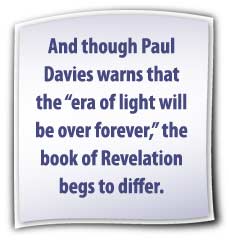“Some say the world will end in fire;
Some say in ice . . .”—Robert Frost.
 NE DOESN’T USUALLY THINK OF THE LAWS OF PHYSICS AS DEPRESSING, but the second law of thermodynamics comes close. In the simplest version it states that heat flows from hot to cold, never the other way around.
NE DOESN’T USUALLY THINK OF THE LAWS OF PHYSICS AS DEPRESSING, but the second law of thermodynamics comes close. In the simplest version it states that heat flows from hot to cold, never the other way around.
We see it all the time. The heat in a bowl of hot soup moves from the higher temperature to the lower, that is, from the soup to the air in the room. An ice cube in a cup of water eventually melts because cold (the ice cube) moves toward only the warmer part of whatever it comes into contact with (the water). Heat is about as likely to flow spontaneously from cold to hot as raindrops would rise spontaneously from the ground to the clouds.
What’s depressing about this second law of thermodynamics? According to science, this law holds true for the universe, which means, we’re told, that the cosmos is dying out. Our sun, as with untold billions of other suns, continuously pours heat into the universe, never to return to its source. This heat will eventually be equally distributed throughout the cosmos (kind of like ice cubes in a cup of water), a situation referred to, innocuously enough, as “thermodynamic equilibrium.” When “thermodynamic equilibrium” happens to the universe, it’s called cosmic heat death or, in more colloquial terms, the Big Freeze.
 “The universe,” wrote physicist Paul Davies, “currently aglow with the prolific energy of nuclear power, will eventually exhaust this valuable resource. The era of light will be over forever.”
“The universe,” wrote physicist Paul Davies, “currently aglow with the prolific energy of nuclear power, will eventually exhaust this valuable resource. The era of light will be over forever.”
Though scientists agree on the second law of thermodynamics, not all think it will be our demise. Some say gravity, instead, will bring the cosmic apocalypse. According to this theory, though the universe is expanding, the rate of expansion isn’t strong enough to counteract the force of gravity. And eventually the expansion will slow down, stop, and the universe will then start collapsing in on itself. The collapse continues until the entire universe ends up in a tiny point of mass and energy too small to contain a proton. This is the Big Crunch.
Another theory speculates that all the matter in the universe—from galaxies to subatomic particles—is going to be torn apart and left in useless shreds. The Big Rip.
Big Freeze, Big Crunch, Big Rip . . . according to science, our long-term prospects are not too good.
Of course, the Bible presents radically different long-term prospects. It talks about the Lord creating “new heavens and a new earth” (Isa. 65:17). Scripture again and again promises “eternal life” (Matt. 25:46; John 3:15; 17:3; Acts 13:48; Titus 3:7; Rom. 2:7; 5:21; 1 John 5:13). The book of Daniel, meanwhile, declares that God is going to create a kingdom, and “His dominion is an everlasting dominion that will not pass away, and his kingdom is one that will never be destroyed” (Dan. 7:14)—not by a Big Freeze, a Big Crunch, a Big anything. It’s going to be eternal.
And though Paul Davies warns that the “era of light will be over forever,” the book of Revelation begs to differ. “There will be no more night. They will not need the light of a lamp or the light of the sun, for the Lord God will give them light. And they will reign for ever and ever” (Rev. 22:5).
The problem is that these cosmological theories all proceed from an apparent a priori commitment to atheistic materialism. The universe is all there is or ever could be. No place for God or the supernatural at all—a premise that helps explain why they got it so wrong.
Thus, a humble question: if current science has our ends all wrong, what makes us think it’s done any better with our beginnings?
__________

 “The universe,” wrote physicist Paul Davies, “currently aglow with the prolific energy of nuclear power, will eventually exhaust this valuable resource. The era of light will be over forever.”
“The universe,” wrote physicist Paul Davies, “currently aglow with the prolific energy of nuclear power, will eventually exhaust this valuable resource. The era of light will be over forever.”